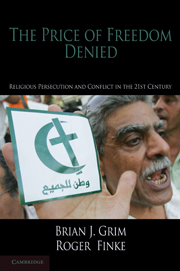Book contents
- Frontmatter
- Contents
- Preface:Religions' Shared Experience of Religious Persecution and Conflict
- 1 Religious Persecution
- 2 Religious Freedom
- 3 Persecution
- 4 Case Studies
- 5 A Closer Look
- 6 What about Muslim-Majority Countries?
- 7 Do Religious Freedoms Really Matter?
- Appendix Testing the Competing Arguments
- Bibliography
- Index
Preface:Religions' Shared Experience of Religious Persecution and Conflict
Published online by Cambridge University Press: 05 June 2012
- Frontmatter
- Contents
- Preface:Religions' Shared Experience of Religious Persecution and Conflict
- 1 Religious Persecution
- 2 Religious Freedom
- 3 Persecution
- 4 Case Studies
- 5 A Closer Look
- 6 What about Muslim-Majority Countries?
- 7 Do Religious Freedoms Really Matter?
- Appendix Testing the Competing Arguments
- Bibliography
- Index
Summary
Violent religious persecution is nothing new. Nowhere is this clearer than in the prominence that persecution plays in religious rituals and identity. The pronouncement by Moses and Aaron that Pharaoh must let God's people go, recorded in the Old Testament book of Exodus, is reflected in annual commemorations by the three major monotheistic religions originating in the Middle East, namely Judaism, Christianity, and Islam. Each year, the Jewish holiday of Passover commemorates their rapid Exodus from persecution. The Passover is also closely tied with the Christian celebration of both Easter and the Eucharist, and Muslims have historically also commemorated the Exodus from Egypt led by Moses on Ashura, the day the Prophet Muhammed initially designated as a day of fasting.
But the significance of violent persecution for the Abrahamic religions is not confined to the Exodus from Egypt. Jews commemorate other persecution and deliverances, ranging from Hanukkah to the World War II Holocaust. Among Christians, many of the most venerated apostles, missionaries, and saints were also persecuted and martyred. The Muslim calendar itself is dated from the Al-Hijra, or Muhammed's migration from Mecca to Medina to escape violent persecution. And today, Ashura is primarily associated with commemoration of the martyrdom (at the hands of other Muslims) of Imam Hussein, whose progeny Shia Muslims regard as the rightful bloodline to succeed the Prophet Muhammed.
- Type
- Chapter
- Information
- The Price of Freedom DeniedReligious Persecution and Conflict in the Twenty-First Century, pp. ix - xivPublisher: Cambridge University PressPrint publication year: 2010

